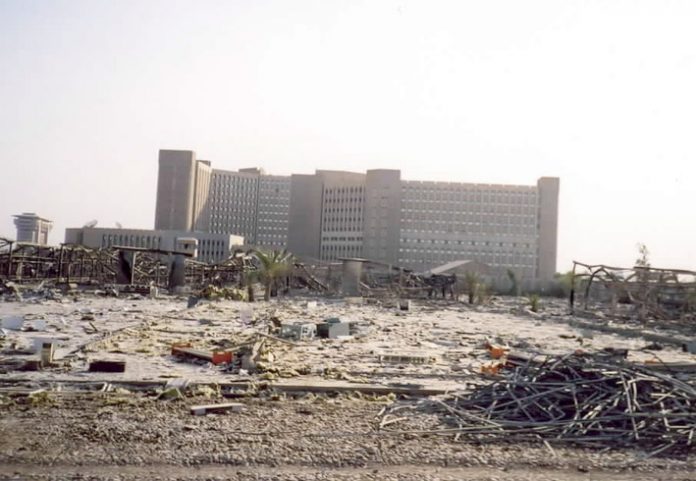
US Defence Secretary Robert Gates on Wednesday hinted at the prospect of a faster withdrawal of US troops as he urged Iraq’s Arab and Kurdish leaders to settle their feuds.
Speaking to reporters after a two-day visit to Iraq, Gates said that there was ‘at least some chance for a modest acceleration’ of plans for the drawdown of American troops this year.
Referring to his talks with the top US commander in Iraq, he said a stepped up withdrawal was possible ‘because of the way General (Ray) Odierno sees the way things going’, citing declining violence and increasingly capable Iraqi security forces.
The current plan would have two combat brigade teams depart by the end of the year but Gates said that ‘maybe one more’ brigade could be withdrawn as well before elections in January.
The precise number of additional troops that might be withdrawn remained unclear but a combat brigade comprises about 3,000 to 4,000 troops and is often accompanied by supporting units.
There are 14 US combat brigade teams now deployed in Iraq.
Violence has dropped markedly throughout Iraq in recent months, though attacks increased in the run-up to the US military’s pullback from urban areas last month, with 437 Iraqis killed – the highest death toll in eleven months.
Gates spoke after a meeting with Massud Barzani, the puppet president of Iraq’s autonomous Kurdish region, following talks on Tuesday with puppet Iraqi Prime Minister Nuri al-Maliki in Baghdad.
‘He reminded his hosts that we have all sacrificed too much in blood and treasure to see the gains of the last two years lost to political differences,’ the US defence secretary’s press secretary Geoff Morrell said after the meeting with Barzani.
Gates told the Kurdish leader in the regional capital Arbil that it is vital both sides move quickly before US forces leave Iraq.
‘He urged them to take advantage of our remaining time in Iraq to settle some of these disputed issues they have with the central government in Baghdad,’ Morrell told reporters accompanying Gates as he flew from Iraq to Turkey.
Odierno told reporters on Tuesday that while violence continues to decline overall, tensions between Iraqi Kurds and Arabs over boundaries and oil revenues represent the biggest threat to the country’s stability.
The US general said: ‘We think that many of the insurgent groups are trying to exploit Kurd-Arab tensions in the north.’
He said that the US military is closely monitoring the situation and has set up liaison offices with commanders of Kurdish militia and the puppet Baghdad government’s forces to try to prevent tensions from escalating.
Gates, speaking to reporters aboard his plane on Wednesday, said no decision has been taken on the drawdown and he will wait for advice from the US commander in the next few months.
‘It really depends on circumstances,’ he said.
Under a timetable approved by President Barack Obama, all US combat troops are due to pull out of Iraq by the end of August 2010 and a security pact with Baghdad requires all American forces to leave by the end of 2011.
Only months ago, US officers and analysts warned of a fragile situation in Iraq that could be jeopardised if American forces were pulled out too quickly.
Odierno and other top generals pressed Obama to allow for a larger US force in Iraq until pivotal elections in January.
The Obama administration has been anxious to free up troops and resources for a military buildup in Afghanistan.
Gates said the fact that Odierno was considering a faster drawdown showed that security trends were promising in Iraq after US forces pulled out of cities and towns at the end of last month.
Gates said that ‘it is an indicator of his view that things are going pretty well following June 30th.’
l Massud Barzani was re-elected president of Iraq’s autonomous region of Kurdistan and the two main Kurdish parties, which ran on a joint parliamentary list, won 57 per cent of the vote in weekend elections, official results showed on Wednesday.
Barzani, who had been widely expected to win, secured 69.57 per cent of the popular vote in Saturday’s poll.
The joint Kurdistan list, comprising Barzani’s Kurdistan Democratic Party (KDP) and the Patriotic Union Kurdistan (PUK) of Jalal Talabani, meanwhile, won 57 per cent of the legislative vote.
According to the results a key opposition grouping called Change won 23.57 per cent of parliamentary votes, faring much better than expected.
Change, largely made up of PUK defectors, and a leftist-Islamist list called Services and Reform have condemned what they have called voter fraud in the elections, insisting they made bigger breakthroughs than preliminary results showed.
Services and Reform won 12.8 per cent of the parliamentary vote, according to Wednesday’s results.
Nearly 80 per cent of the autonomous Kurdish region’s 2.5 million voters took part in what poll officials claimed as a transparent election.
The vote was held at a key juncture, as regional leaders remain locked in a bitter dispute with Baghdad over land and oil, while local voters also voiced increasing concern over corruption.
• Ten people were killed and 42 others were injured in bomb attacks across Baghdad on Tuesday, police said.
A motorcycle bomb near a cinema in a crowded area of eastern Baghdad’s neighbourhood of Baghdad Jadida (new Baghdad) killed eight people and wounded 14 others at around 7.00 pm (1600 GMT), said a police officer, who declined to be identified.
In a separate attack in the Iraqi capital, two people were killed and 28 injured by a bomb which exploded in the middle of a popular coffee shop in the northern Baghdad neighbourhood of Al-Kasra, another police officer said.
The bombings coincided with US Defense Secretary Gates’ visit to Iraq.